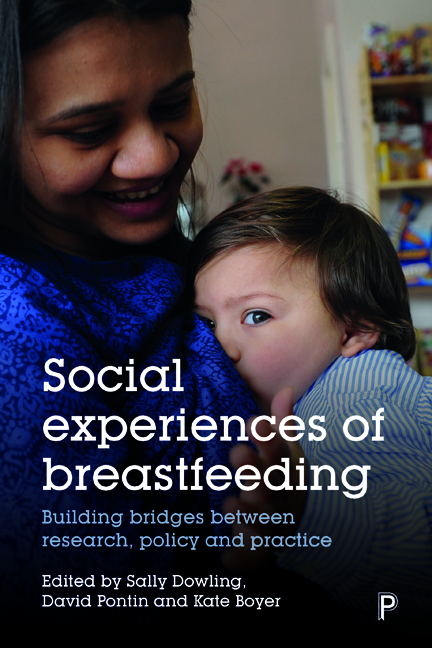Book contents
- Frontmatter
- Dedication
- Contents
- List of tables and figures
- Notes on contributors
- Acknowledgements
- Introduction
- The UK policy context: reconfiguration of the Unicef UK Baby Friendly Initiative to reflect the importance of relationships and ensuring sustainability
- Part I Breastfeeding and emotions
- Part II Cultures of breastfeeding
- Part III Breastfeeding and popular culture
- Conclusion
- Appendix: Schedule for ESRC Seminar Series: Social Experiences of Breastfeeding: Building bridges between research and policy, 2015–16
- Index
Breastfeeding and popular culture: reflections for policy and practice
Published online by Cambridge University Press: 22 April 2022
- Frontmatter
- Dedication
- Contents
- List of tables and figures
- Notes on contributors
- Acknowledgements
- Introduction
- The UK policy context: reconfiguration of the Unicef UK Baby Friendly Initiative to reflect the importance of relationships and ensuring sustainability
- Part I Breastfeeding and emotions
- Part II Cultures of breastfeeding
- Part III Breastfeeding and popular culture
- Conclusion
- Appendix: Schedule for ESRC Seminar Series: Social Experiences of Breastfeeding: Building bridges between research and policy, 2015–16
- Index
Summary
Introduction
This commentary is informed by personal written reflections as well as ideas from a conversation, both of which sparked our engagement with the chapters and the meaning of the seminar series to us. Quotes within the chapter are from these conversations and reflections; we decided not to identify ourselves in relation to these.
Something about us
We each came to the seminar series with different experiences of society, as women, mothers and workers. Between us, in our personal and professional lives and over 30 years, we have lived through many phases of infant feeding policy and practice. Early and late maternity is part of our experience:
‘I have had four children over 23 years, I became a mum at the age of 18 and had my last baby when I was 40 years old, which has taken me on my breastfeeding journey. I have also become a grandparent, so I have been able to support my daughter and her partner at the beginning of their journey as parents.’
The seminars gave us time to reflect on breastfeeding in a group setting with some novel and fresh approaches, as well as more familiar ones. Women breastfeed in a social context, and one thing that struck us about the series was that it was about sharing women's stories. This prompted us to share ours a little:
‘I realise that I was lucky to have far fewer obstacles in my way when breastfeeding my girls. The majority of women in my wider community breastfed; I had an encouraging and supportive partner and great care. I was breastfed during the ‘60s – I remember my mum being really proud of this – and my grandmothers breastfed a total of 11 babies in the 1930s and ‘40s!’
The seminars brought home the different stories of women who must navigate complex societal and cultural barriers to start and keep breastfeeding. The three of us support them in different ways, covering the voluntary sector, public health and early years services, providing support for women, leadership, national and local strategy development, and commissioning services.
- Type
- Chapter
- Information
- Social Experiences of BreastfeedingBuilding Bridges between Research, Policy and Practice, pp. 237 - 244Publisher: Bristol University PressPrint publication year: 2018



